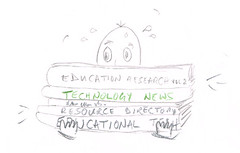A couple of months ago I invited people to contribute to a survey about what they were doing to prepare for the new Computing curriculum. About 75% of my motivation for doing so was to help to spread ideas. I believe in the grass roots sort of approach to such things, as opposed to the ‘great and the good’ declaring what the rest of should be doing. Actually, to clarify, I don’t mind if the great and the good are doing it or have done it themselves. I find it tedious when people who have never been a teacher and/or had little contact with schools start issuing advice. OK, rant over!
 Photo by Laurie Sullivan https://www.flickr.com/photos/projectdiscovery/I have to admit, though, that the other 25% of the reason was a vague worry that perhaps my own suggestions and advice to schools when I give talks on the subject have been inadequately informed simply through not knowing about the existence of some resources. Obviously, no one person can know it all. Having said that, so far I think there has been only one website I hadn't known about. There seems to be a core set of websites, like Code Academy, that lots of people are using.
Photo by Laurie Sullivan https://www.flickr.com/photos/projectdiscovery/I have to admit, though, that the other 25% of the reason was a vague worry that perhaps my own suggestions and advice to schools when I give talks on the subject have been inadequately informed simply through not knowing about the existence of some resources. Obviously, no one person can know it all. Having said that, so far I think there has been only one website I hadn't known about. There seems to be a core set of websites, like Code Academy, that lots of people are using.
I’m pleased to say that what started as a trickle of responses has developed into – well, not a flood exactly, but a sort of rivulet. At least, I have enough responses that were I to publish them now I would not feel embarrassed at the futility of the exercise. However, I should like to wait a bit longer to give people more chance to respond if they wish, and because I don’t have time for the next week or so to do much with it anyway.
My aim is to collate the responses into an ebook, with an alphabetical index of resources with hyperlinks. It would be good to get more responses from primary schools. Interestingly, many schools, including primary schools, are adopting a project-based learning approach.
Those who respond in a genuine way (ie not just filling in the boxes with rubbish) will receive my seminal, lifetime’s work, “42 useful tools, apps and websites for Computer Education”. Well, “lifetime’s work” may be slightly overstating it, but it’s a pretty good document nonetheless. I’d be surprised if I wasn’t mentioned in the Honours List because of it.
To learn more about this project, please see The Amazing Computer Education Projects Book, where you will also find the online survey form. To read an earlier update, please go to Computer Education Projects Book Update
 Your newsletter editor is hard at work doing research for Digital Education, the free newsletter for education professionals. Have you subscribed yet?
Your newsletter editor is hard at work doing research for Digital Education, the free newsletter for education professionals. Have you subscribed yet?
Read more about it, and subscribe, on the Newsletter page of the ICT in Education website.
We use a double opt-in system, and you won’t get spammed.
